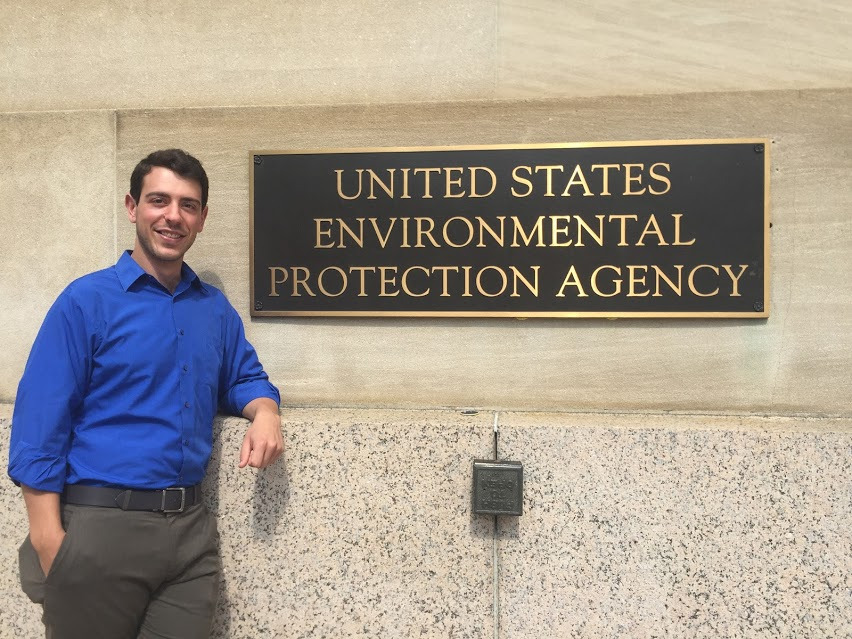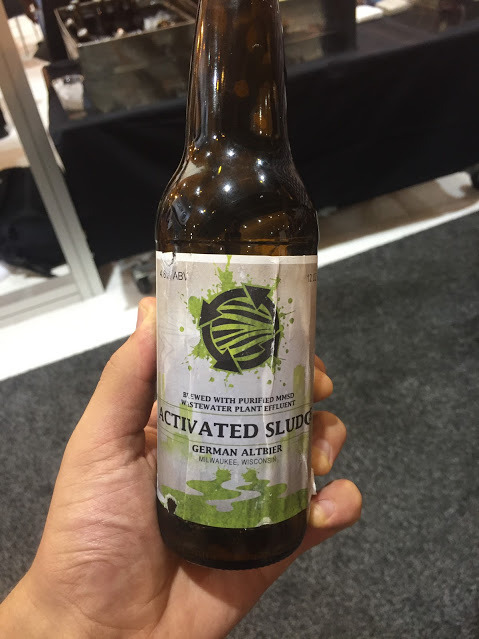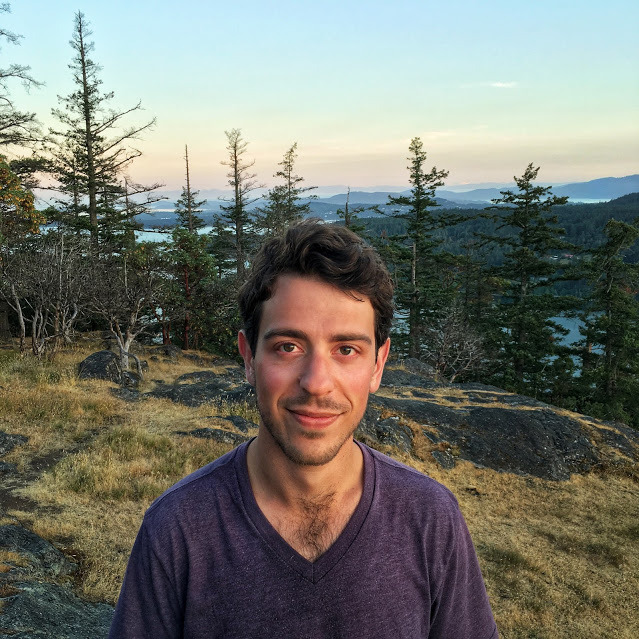Growing up in Colorado’s high country, Jake Adler always had a heightened awareness of water issues, whether it was the seemingly out-of-place, giant tunnels in the forest near the Continental Divide that diverted river water to Denver, the daily conversation about water scarcity, or the public health concern about safe drinking water around the world. Even as a child, Adler recognized there was no easy solution to water issues but knew he wanted to be a part of it.
When Adler (B.A. ’14, M.A. ’16) came to Colorado State as an undergraduate, he envisioned himself working on western water policy or natural resources management in Colorado. He started out as a biology major but quickly realized he also had a passion for local governance and community development, which inspired him to change his major to political science. After graduation, Adler pursued a master’s degree in political science, focusing on environmental politics and policy, and public administration. Upon graduating with his master’s degree in 2016, he knew his education and passions could take him in a variety of directions but he found himself returning to water.
From College to Career
Interning by day, job-hunting by night, Adler came across an opportunity for a research project called “defining water resource sustainability.” Thinking there was no way that he would be the right fit, he applied with low expectations. A month later, he was driving to Washington, D.C. to start his fellowship with the Oak Ridge Institute for Science and Education (ORISE).
ORISE, which is affiliated with Oak Ridge Associated Universities, provides STEM-related opportunities for recent bachelor’s, master’s, and Ph.D. graduates and faculty to participate in research projects at select federal agencies. Adler has a one-year fellowship, renewable up to three times, and has just completed his second year.
Adler specifically works on the Water Technology and Innovation Blueprint with the Environmental Protection Agency (EPA) Office of Water. In addition to administering the Clean Water Act and the Safe Drinking Water Act, there are 10 market opportunities that the EPA Office of Water works to support. Adler’s research looks at those market opportunities as they relate to water resource sustainability.


One example of a market opportunity for wastewater is called resource recovery, which uses waste and turns it into an output that can be used by consumers. Because treating sewage and other varieties of wastewater can take up two to five percent of all electricity consumed by a community, there is a market for technologies and infrastructure to reduce those energy costs.
“As it turns out, sewage itself can produce energy, and technologies have been developed that can harness that energy,” Adler said. “One day, treatment plants could be energy generators, not users.”
However, in order for there to be change, there must first be a shift in perceptions; wastewater must be viewed as a resource. Much like aluminum cans were viewed as resource recovery in the early days of recycling, or sewer gas has been used to power street lights in New Orleans for more than a century, wastewater can be re-used to “recover” the cost of managing it.
“If recoverable resources in wastewater are not accounted for, there is no market for them, technologies will not be developed to recover them, and the task of ensuring public and environmental health is not made easier,” Adler said.
Adler’s research also focuses on green infrastructure and storm-proof, resilient communities; advanced water monitoring technologies; western water innovations; defining water resource sustainability; water reuse; and solutions to issues that complicate public health agencies’ and water utilities’ jobs.
Since water isn’t centrally managed by the government (there is no “Department of Water”), the resource is broken up into separate categories: storm water, wastewater, surface water, ground water, etc.
“Society has focused on managing each category independently, not altogether,” said Adler. “But no matter what condition it’s in, it’s all the same water.”
All of Adler’s team’s research and work focuses on the whole water cycle and follows the One Water concept. One Water is “an integrated planning and implementation approach to managing finite water resources…to achieve sustainable, reliable, and resilient water systems.”
“It’s about thinking more broadly about the entire water cycle, in a collaborative manner, to work toward water resource sustainability,” said Adler. “It helps entities and communities (and their water) be more resilient, more efficient, more coordinated.”
The Preparation to Succeed
Because there are so many complex issues related to water, Adler remembers his first six months at the EPA felt like another master’s degree program. However, Adler’s experiences at CSU, both in the classroom and through internships, helped him believe he can thrive in anything.
“It’s difficult to think of things I did at CSU that haven’t been valuable,” said Adler. “One overarching element is exposure to diverse experiences and people.” He participated in the Colorado Legislative Internship program as an undergraduate and the experiences he gained there have helped him at EPA.
“It helped me feel comfortable in a room full of ‘bigwigs’ and learn how to be effective, strategic, and sharp when surrounded by hundreds of other people also striving to be effective, strategic, and sharp,” said Adler.
His fellowship has also led him to realize that in addition to water, he is equally passionate about sustainability and making society better as a whole.
“Since sustainability and making society work better are uniquely hinged to water, I am very happy to be tackling those things in a water-centric manner,” said Adler.
With two more years of eligible funding for his fellowship, Adler has started to think about what is next for him at the nexus of sustainability, public health, and public management. He’s also looking into Ph.D. programs in environmental policy and sciences.

Making a Difference As An Individual
As Adler has known his whole life, water problems are complicated, and because almost everyone contributes to water problems – whether it be flushing the toilet, fertilizing a lawn, using electricity, or buying foods with significant environmental impacts – society should focus on implementing a wide array of solutions rather than assuming there will be one big fix.
“I don’t think there is a silver bullet to water issues, at any level, but focusing on the little things you can do every day can really make a significant difference,” Adler said.
There are many ways, big and small, to get involved in water issues
Learn
- Listen to podcasts like WEF’s “Words on Water” and Circle of Blue’s “What’s Up With Water”
- Watch YouTube lectures and TED Talks from water chemists and engineers who make the topic accessible and interesting, such as David Sedlak.
- Take a tour of a farm to see all the effort involved in agricultural water management and environmental protection; reconsider what food you purchase, accordingly.
- Explore what water advocacy associations like U.S. Water Alliance are saying and writing, including, “How You Can Help!”
- Find out if a watershed partnership or stewardship group exists in your area, what they do, and how you can participate.
Discuss
- Talk to somebody at water or wastewater utility about what they do.
- Talk to a city/county planner to understand how water affects land use (and vice versa), the local economy, and zoning.
- Find out when your Town Council is scheduled to discuss the town water plan, updates to water infrastructure, or the town capital improvement plan – and show up.
- Talk to a river keeper and learn how to collect water data, and what the data means.
Get Involved
- Get involved in CSU’s Water Center and review the research by the CSU-affiliated Colorado Water Institute.
- Join a cleanup event, such as the International Coastal Cleanup, or restoration events hosted by watershed organizations such as Coalition for the Poudre Watershed.
- Participate in the annual Imagine a Day Without Water.
- Look into how you can get involved in water sanitation and hygiene (WaSH) efforts in the U.S. and abroad
Ultimately, get water literate. Since water is one of the more complicated topics there is, doing your homework can optimize how you participate.
Disclaimer: Jake Adler is not an employee of EPA and his words should not be construed as endorsement from, or endorsed by, EPA.
